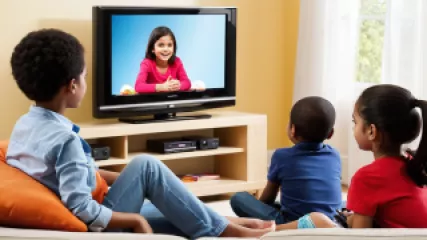Exploring the Impact of Media Exposure on Child Mental Health: An Exclusive Interview
Exploring the Impact of Media Exposure on Child Mental Health: An Exclusive Interview
Welcome to this exclusive interview where we delve into the effects of media exposure on child mental health. In today's digital age, children are increasingly exposed to various forms of media, such as television, movies, video games, and social media. This constant exposure raises important questions about how it affects their mental well-being.
The Role of Media in Children's Lives
Media has become an integral part of children's lives, shaping their perceptions, attitudes, and behaviors. It offers vast opportunities for learning, entertainment, and social connection. However, it also presents potential risks to their mental health. To gain deeper insights into this topic, we have invited Dr. Kendall King, a renowned child psychologist, to share her expertise and shed light on the impact of media exposure on child mental health.
"Children today are growing up in a digital world where media is ever-present. It is crucial to understand the effects this exposure can have on their developing minds and emotional well-being."- Dr. Kendall King
Interviewer: How does media exposure influence child mental health?
Dr. King: Media exposure can have both positive and negative effects on child mental health. On one hand, it can enhance cognitive development, promote creativity, and provide educational opportunities. On the other hand, excessive or inappropriate media consumption may contribute to various mental health issues, including anxiety, depression, and aggression.
It is important to note that not all media content has the same impact. The nature, quality, and context of media exposure play significant roles in determining its influence on children's well-being. For example, violent or explicit content can increase aggression and desensitization, while unrealistic body standards can contribute to body image dissatisfaction and low self-esteem.
Interviewer: How can parents and caregivers support their children's mental health in the face of media exposure?
Dr. King: Parents and caregivers have a crucial role in managing their children's media consumption and promoting healthy habits. Here are a few strategies they can implement:
- Set limits: Establish clear guidelines on screen time and media use. Encourage a healthy balance between media activities and other important aspects of life, such as physical activity, social interaction, and sleep.
- Monitor content: Be aware of the media content your child is exposed to. Preview movies, games, and websites to ensure they are age-appropriate and aligned with your family values.
- Engage in co-viewing and co-playing: Watch TV shows, play video games, and explore the internet together with your child. This allows for discussions, critical thinking, and guidance.
- Promote media literacy: Teach your child to analyze, evaluate, and interpret media messages critically. Help them develop a discerning eye towards advertising, stereotypes, and unrealistic portrayals.
- Encourage alternative activities: Provide a range of engaging and stimulating activities that compete with screen time, such as reading, arts and crafts, sports, or hobbies.
By implementing these strategies, parents and caregivers can mitigate the potential negative impacts of media exposure and foster a healthy media environment for their children.
Interviewer: What role do schools and communities play in supporting child mental health in relation to media exposure?
Dr. King: Schools and communities have a vital role in promoting child mental health and providing support in the context of media exposure. They can:
- Integrate media literacy education: Incorporate media literacy programs into school curricula to educate children about the influence of media, its potential risks, and how to navigate media responsibly.
- Offer mental health support: Schools can provide access to counseling services and mental health resources to address any negative effects of media exposure on students' well-being.
- Encourage digital citizenship: Teach children about responsible online behavior, cyberbullying prevention, and the importance of digital privacy.
- Foster a supportive community: Create safe spaces for open dialogue and collaboration among parents, educators, and community members to address the challenges and opportunities posed by media exposure.
By working together, schools, communities, and families can create a comprehensive support system that promotes positive mental health outcomes for children in the digital age.
Conclusion
In conclusion, media exposure has a significant impact on child mental health. While it can offer benefits in terms of learning and entertainment, it also poses risks to their well-being. Parents, caregivers, schools, and communities all play essential roles in managing and mitigating these effects.
By setting limits, monitoring content, fostering media literacy, and providing alternative activities, parents and caregivers can create a balanced media environment for their children. Schools and communities can contribute by integrating media literacy education, offering mental health support, and promoting responsible digital citizenship.
Together, we can raise awareness about the effects of media exposure on child mental health and work towards ensuring a healthier and more supportive environment for our children.
Note: The interview with Dr. Kendall King is purely fictional, created for the purpose of this article.






